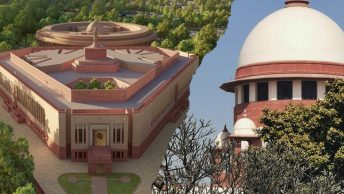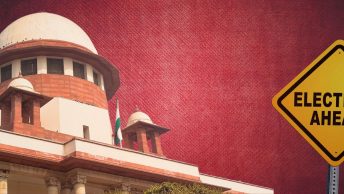5 August 2020 marked one year of hollowing out Article 370 of the Constitution of India, thus unilaterally abrogating the constitutional relationship between the Indian Union and the State of Jammu and Kashmir. This post collates a Reading List of articles on the background of Article 370 and its effacement over the years, the implications of its hollowing out, and ground reports of its aftermath.
De-Operationalization of Article 370
- One Nation, One Flag, One Constitution? by Shrimoyee Nandini Ghosh, published on Raiot: “In short, while the constitutional changes are cataclysmic and seem irreversible, in the domain of the everyday, the legal conquest of Jammu and Kashmir is neither as complete nor unquestionable as celebrating members of the ladoo-distributing public would like to believe.”
- Internal? Bilateral? International? by Shrimoyee Nandini Ghosh, published on Raiot: “The changes in Jammu and Kashmir’s constitutional status and the annihilation of its territorial integrity through the J&K Reorganisation Act of 2019, have transformed the occupation, characterized by the de jure (in law) “temporary” suspension of Kashmiri sovereignty, into a permanent and irreversible annexation of its territory in law and fact.”
- Constitutional Lies and the Afterlives of Law in Kashmir by Shrimoyee Nandini Ghosh, published on Raiot: “In “debunking” specific myths about the law in Kashmir I must confront my debilitating doubts about reinforcing a big, fat, foundational lie – that justice for Kashmiris is possible in a legal system premised in Indian law and constitutionalism once it is stripped of the falsehoods and injustices perpetrated in its name.”
Detention & Curfews
- Even as thousands are detained in Kashmir, courts and legal system remain frozen by Anumeha Yadav and Megha Rao, published at Scroll.in: “Interviews with the families of those detained suggest many are not able to file petitions. In a large number of cases, there is no first information report or any kind of paperwork to show for the detention.”
- The Public Safety Act is a Political Weapon For the Government in Kashmir by Freny Manecksha, published at The Wire: “It is also no secret that the police file open FIRs and then try and negotiate with the parents or relatives for release of the youths. (Open FIRs are when police stations report incidents of rioting and so on, and cite “unknown persons” as the accused. This enables them to add names later.)”
- Rule of the Lawless Law by Gaurav Bhawnani, published at the Economic and Political Weekly, on the wide, vague charges, absolute executive discretion, absence of reasons, delays in issuing PSA orders, or orders against those already in custody such that the purpose of preventive detention is defeated.
- Update on Human Rights Violations in the Indian-administered Jammu & Kashmir since August 2019, published at International Federation For Human Rights, published just a month and a half after the degradation of J&K into Union Territories, recording 4000 arrests, torture, deaths in protests and restrictions on the right to worship thanks to the harsh curfew, the communication shutdown and its impact on journalists, students and public health.
- A Nation Rendered Numb by Parvaiz Bukhari published at Adi Magazine: “In village after village, residents narrated harrowing stories of what was done to them from the night of August 4 onward, after the total communication blackout was firmly put in place. Indian soldiers from the hundreds of camps that dot the rural landscape of Kashmir had repeatedly descended into villages, raiding and vandalizing homes, smashing cars, and destroying stocks of rice and pulses (sometimes even mixing in kerosene). Villagers told of how in the dead of the night young men were tortured on the roads and inside army camps, after soldiers had confiscated their smartphones.
Frightened villagers corroborated each others’ tales of torture and narrated instances of how their shrieks were broadcast over loudspeakers to terrorize entire neighborhoods. They described how soldiers would routinely ask young men to report to their camps to collect back their phones, which at the time were nothing more than devices used to record evidence of the horrors inflicted upon them. To report to the camp then was to almost volunteer for abuse and torture. If their smartphones were returned, it was only after all incriminating video had been deleted.” - Surviving the Occupation by Syed Tajamul Imran and Mohd Tahir Ganie, published at Adi Magazine: “I cannot forget what my father’s uncle, Ba’jaan, told me when we were driving through the bazaar one fine day. “Look around,” he told me, “look closely at the faces of people. Can you find anyone with even a semblance of happiness on his face?” I nodded but said nothing. “Kasheer gai waraan,” he said. Kashmir has been turned into desolation.
- ‘India talked of peace and calm in Kashmir. I saw the opposite’ by Sasha Bhat, published at Al Jazeera: “I watched the news and broadcasts from the central government, celebrating democracy and freedom. Prime Minister Narendra Modi talked about the Indian people’s joy about the Kashmir decision – I marveled at how a nation of a billion people can rejoice over the misery…”
Impact on Media Freedom
- Diary of Srinagar lockdown by Sankarshan Thakur, published at Telegraph: “This was not even censorship, not about what you can or cannot report. This was being cut out and left cold.”
- ‘We may have to shut down permanently’: Online Media In Kashmir Has Come to a Grinding Halt by Zafar Aafaq, published at The Polis Project: “In February 2019, the Indian government banned ads on prominent newspapers Greater Kashmir and Kashmir Reader. This meant a drastic decrease in revenues, forcing the newspapers to curtail salaries.”
- A War Against Words by Hilal Mir, published at Adi Magazine: “Handing over the unedited copy of the interview exposed the freelance reporter to the Indian police system, where a prolonged prosecution often becomes punishment. There was a realization at the newspaper that we had been marked precisely for such a punishment, and the pressure tactics wouldn’t stop here. The immediate fallout? Self-censorship.
The boss began to read every last line of major stories of the day. He would, of course, read between the lines, too. Anything that could be misread by the Indian government as pro-freedom would be tweaked. The newspaper’s style sheet gradually changed to suit government sensibilities. Stories that deserved prominent display were relegated to inside pages. Several regular columnists were asked to go slow on Kashmir-centric issues and later requested to stop writing altogether.
“How difficult is it to get your head around the fact that the situation is scary? Kashmir is North Korea,” the boss told a copy editor one day.”
Impact on Healthcare
- Kashmir ground report: A cancer patient struggles to reach hospital for chemo, others can’t get home by Safwat Zargar, published at the Scroll.in, on the complete health care breakdown that the Indian state unleashed with the communication shutdown and security checks.
- Ground Report Kashmir: Pregnant Women, Families Suffer Amid Travel Restrictions and Overcrowded Hospitals by Safina Nabi, published at NewsCentral, on the maternity health care crisis inflicted on Kashmiris by the Indian state. “The family travelled for three hours from Hajin in Bandipora to Srinagar for her delivery.”
- A year without high-speed internet ravaged health, education, entrepreneurship in Kashmir by Safwat Zargar, published at Scroll.in on the fallout of having 4G internet suspended during the COVID-19 pandemic, for healthcare and otherwise.
Impact on Education and Environment
- Kashmir’s students struggle with online classes, as internet shutdown in region approaches one year mark by Aakash Hassan, published at Medianama, discussing the impact on students of the aggravating COVID lockdown amid the Kashmir lockdown.
- With state under lockdown, J&K FAC issues record forest clearances by Ishan Kukreti, published at Down To Earth, documenting the high number of clearances being granted to environmental projects by the Forest Advisory Committee (FAC) of J&K, in the face of criticism by forest rights activists.
- Mining expands on Kashmiri rivers despite dire warnings by Athar Parvaiz for The Third Pole notes how despite the warnings from a research commissioned by the government itself, it has gone ahead to open mining auctions in Kashmir that threaten the stability of the riverbed, flood control mechanisms, and local livelihoods.
The Domicile Law
- Open Letter to the UN Secretary General, against the forced demographic change being executed through the new domicile law introduced in Kashmir.
- J&K’s New Domicile Order: Disenfranchising Kashmiris, One Step at a Time by Mirza Saai Bég, published at The Wire. “Effectively, the child of an Indian citizen from any part of the country is eligible, even if the child has never lived in Kashmir, but the child of a diasporic Kashmiri may not be eligible if the parent does not possess an existing certificate of residence.”
J&K Land Reforms
- A year of government policies that eroded hard-won land rights in Jammu and Kashmir by Safwat Zargar & Ipsita Chakravarty, published at Scroll.in discussing the swift undoing of the land reforms that Kashmir had painstakingly undertaken over the last 70 years
- Historical Review of JK Land Reform Laws: (From 1887 – 1976) – Part I and Part II by M J Aslam, published at CounterCurrents.org offering a historical narrative of the Jammu & Kashmir land reforms.
- India eases rules for security forces to acquire land in Kashmir, published at Al Jazeera analysing the recent withdrawal of a 1971 circular by the J&K Administration that required Indian armed forces to obtain a “no objection certificate” before acquiring land.
For more literature marking one year of the siege, see the Jammu & Kashmir Law & Public Policy here and this multi-part Series curated by The Association for Political and Legal Anthropology.







[…] Reading:1. Reading List on Article 370 Abrogation [August 7, 2020]2. Kashmir, the Constitution and Article 370: An Explainer [August 8, 2019]3. […]
Your article helped me a lot, is there any more related content? Thanks!